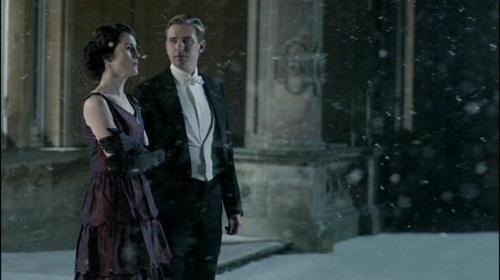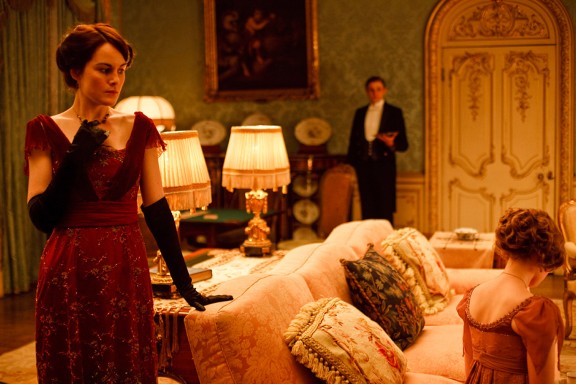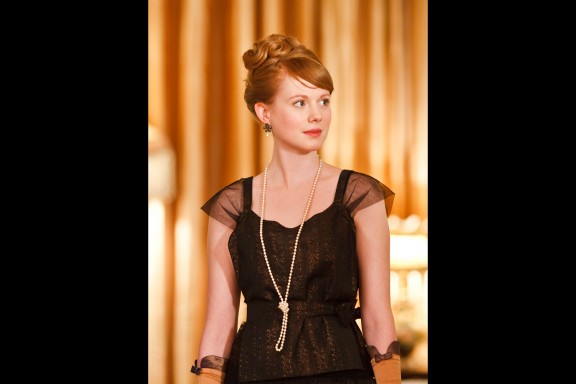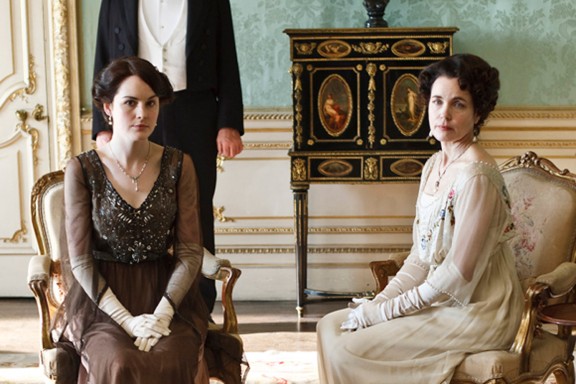Right before the second season premiered in the US last month, I started hearing about Downton Abbey everywhere, kind of the way Mad Men was suddenly everywhere before its second season. So I decided to check it out.
I learned my lesson about blogging about shows before the season finale—The Killing’s season finale was so bad it soured me on the whole show and I probably won’t watch Season 2. Happily, I can’t say the same of Downton Abbey, whose second season finished just as I got caught up with the show.
If you haven’t seen it yet, here’s a quick crash course. Downton Abbey is a large estate in England inhabited by Robert Crawley, the Earl of Grantham; his American wife Cora; their three young adult daughters, Mary, Edith, and Sybil; Robert’s mother Violet; a cute yellow Lab named Isis; and a whole army of servants. The first season starts out in the spring of 1912 as the Titanic has just sunk. Unfortunately, the heir to the estate, their cousin Patrick, is killed in the shipwreck. Patrick was unofficially engaged to the eldest daughter Mary, therefore ensuring that she would inherit the estate despite an entail prohibiting her from doing so because she is a woman. With Patrick dead, they have to track down the new heir—a distant cousin named Matthew who works as a lawyer. That would be nothing to sneeze at for most of us, but for English aristocrats one hundred years ago, even an upper middle class working man is light years away from what they’re used to.
Nevertheless, Matthew and his widowed, former nurse mother, Isobel, move onto the property at Downton. While there are some clashes initially, and while Matthew and Mary get off on the wrong foot, Matthew becomes a part of the family. Matthew and Mary eventually develop a friendship that may become more, and may save Mary from a scandal she has found herself in.
By Season 2, however, World War I has rolled around and things have changed. The old societal order seems less important, and barriers are being broken down. What it will mean when the war is over is less clear.
That was all purposely vague to avoid spoilers, but trust me, there is a LOT to love about this show. The characters, for one, are wonderfully interesting and sympathetic. Maggie Smith as Violet, the Dowager Countess of Grantham, steals every scene she’s in. She’s such a snob, but you know that she loves her family beneath it all, and she comes up with such brilliant one-liners. When a character she doesn’t like tells her that she won’t be seeing him again, she replies, “Do you promise?” When Sybil starts getting involved in politics, Mary comments that Sybil is entitled to her opinion, to which the Countess retorts, “No, she is not entitled to her opinion until she gets married, and then her husband will tell her what her opinion is!” When she and Isobel quarrel over something Isobel thinks she has done, the Countess defends herself, ending with, “Put that in your pipe and smoke it!”
Despite him being way too old for me, I have a bit of a crush on the Earl. He’s warm and gentle and very proud of his family and his estate, taking his role as caretaker of Downton Abbey seriously. He treats his family and his servants with kindness, often reserving judgment on people who have made mistakes, and despite the concern for rank that permeates the world he lives in, he wants above all for those he loves to be happy. He’s certainly not perfect—he can be stubborn and set in his ways and towards the end of Season 2 he does something that made me yell at the TV, but whenever he messes up, he immediately feels guilty and tries to right his wrong as soon as possible. He is a gentleman in every sense of the word.
It has been a long time since I have shipped a couple as much as I have shipped Matthew and Mary. Mary is terrified of what she does not know, and her decisions concerning relationships always revolve around this uncertainty. But she does love Matthew, and their scenes together are wonderfully romantic and sweet. Also, Matthew is quite attractive.
While Mary is afraid of change, the youngest daughter, Sybil, wholeheartedly embraces it. She gets involved with women’s rights in the first season, and when World War I rolls around, not content to sit idly by, she becomes a nurse to take care of wounded soldiers. In Season 2, she begins a romance widely considered taboo. She’s a beautiful, kind, wealthy young woman who could have anyone she wanted, but she is willing to give up the life she’s always known for love.
The middle daughter, Edith, is kind of a bitch but is starting to grow on me. She has a contentious relationship with her older sister Mary, and she does something so awful to Mary in Season 1 that it’s impossible to sympathize with her. But it’s easy to feel bad for her for other reasons. While Mary was engaged to Patrick, it was Edith who loved him and mourned his death the most. I think she has a bit of middle-child syndrome, and as the least attractive of the sisters, no one expects much from her. Her parents even comment at one point that she’ll probably not marry and instead take care of them in their old age.
The narrative focuses about equally on the aristocrats upstairs and the servants downstairs. The mild-mannered valet, John Bates, can’t seem to catch a break, as his past misfortunes keep coming back to haunt him. His ongoing relationship with a maid named Anna is so sweet, and you keep rooting for them despite all the obstacles they face.
There are all kinds of interesting characters among the servants, too: Carson, the professional and fiercely devoted butler; Thomas, the evil gay footman who is always causing trouble somewhere; O’Brien, the lady’s maid who is usually plotting along with Thomas; Daisy, the honest-to-a-fault and easily frightened kitchen maid; and Branson, the highly political chauffeur who strongly influences Sybil. These are just some of the servants we meet, and the personal, romantic, and family issues they all face often parallel what is going on with the family they serve.
The 1910s and 1920s are such an interesting period in history that I’m surprised there isn’t more historical fiction about that time. As the study of modernism in eleventh-grade English class taught me, it was an era where the world was changing in so many ways—women’s rights, socialism, a changing map of Europe. One theme we see gradually emerging over the course of the show is the breakdown of the traditional class structure and people looking to break out of the boxes they’ve been born into. In the first season, it’s a bit more subtle—an upper middle-class lawyer potentially inheriting a large estate, a maid dreaming of getting a job as a secretary instead—but after the war, it is visible on a larger scale. Servants try out alternate roles as many of the men go off to war, Sybil works as a nurse, Edith learns to drive a tractor in the absence of men to do that work, and romances that once seemed forbidden are suddenly possible. As the soldiers in the war find out, bullets and bombs aren’t concerned with social class out on the battlefield.
And on a shallow note? THE CLOTHES. Oh, my God, the clothes.




I covet these women’s wardrobes. If I’ll never be able to spend my days traipsing around a beautiful estate, reading, spending time with friends, and meeting attractive men, as these women do before the war, can I at least get to wear beautiful dresses like these?
The show certainly isn’t perfect. It’s a soap opera, plain and simple, and occasionally the plots get a bit ridiculous or predictable. There are also times when one storyline gets too much attention or when we should see more of another story to be able to understand it better, and one character introduced in the second season is so one-dimensional that her motivations are difficult to understand. But the acting is universally wonderful and, above all, at the end of each episode you truly feel that you have traveled to another world. What more could you want out of a TV show?



